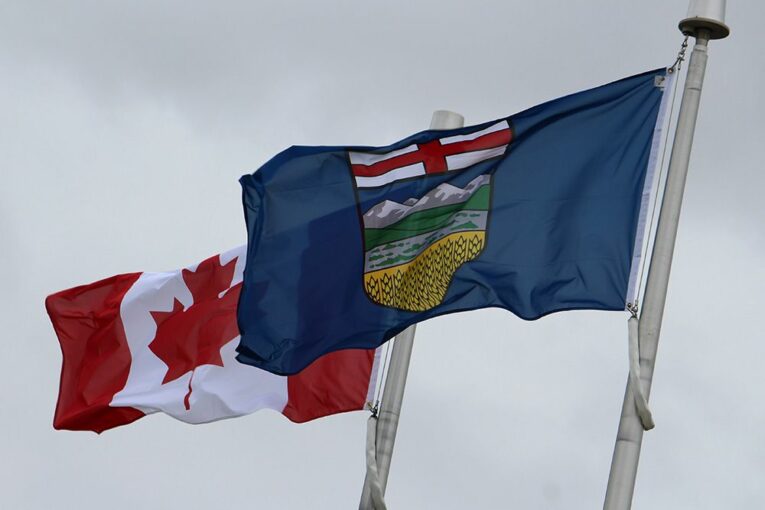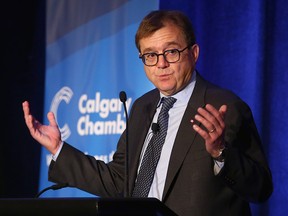
Danielle Smith wants to meet with the prime minister next month and discuss Ottawa’s just transition legislation — and the need to change the incoming bill’s name.
Natural Resources Minister Jonathan Wilkinson seems game: “I have said repeatedly, publicly, I don’t like that term.”
Alberta’s premier wants both governments to focus on incentives to substantially cut greenhouse gas emissions, such as accelerating public investment in carbon capture, utilization and storage (CCUS) projects.
Wilkinson says the feds are busy talking about carbon capture with Alberta and the oilpatch.
Smith wants a partnership to grow the workforce for the provincial oil and gas industry, along with emerging energy sectors.
Wilkinson insists the bill “is not about taking jobs away. This is about creating jobs.”
Watching the provincial and federal governments battle lately over energy is the equivalent of watching two scorpions stuck in a bottle.
They’re focused on attacking, not getting things done.
Yet, there appears to be some alignment here.
Alberta Energy Minister Peter Guthrie said Friday he has a good working relationship with his federal counterpart. While the two sides don’t see eye-to-eye on the just transition bill, they’re talking about other matters, such as creating a resources roundtable to discuss issues including LNG development, and CCUS initiatives.
Alberta’s letter is meant to find some mutual understanding, he suggested.
“Yesterday, I spent the day meeting with industry . . . and we heard loud and clear the industry wants us to continue working with the federal government to find common ground where we can,” Guthrie said Friday.
“It’s a bit of an olive branch to say, ‘Hey, look, we’re not holding this up.’ We are open and willing to have discussions, but they have got to be fair and they’ve got to be on the subjects that matter to Albertans.”
It seems to be an encouraging signal.
Recommended from Editorial
-

Braid: Smith invites Trudeau to Alberta for formal talks on jobs, energy
-

Varcoe: Canada falling behind in race to attract carbon capture investments
-

Varcoe: Smith says Alberta will consider carbon capture aid
The letter from Smith to Justin Trudeau on Thursday might appear as though Alberta is reaching out, although on closer inspection, there’s still plenty of turf to scrap over, said Mount Royal University political scientist Duane Bratt.
Among the requests from Alberta is that Ottawa acknowledges it won’t unilaterally impose emissions targets on the oilpatch and other sectors, which seems like a non-starter.
“It was a carefully crafted letter and, on the surface, it appears to be a softening, but then you read the details and it’s really not,” said Bratt.
“It was a useful letter for political negotiations, but it’s tough to negotiate about legislation that hasn’t even been introduced yet.”
In an interview — and a letter he co-authored and posted on Twitter to Alberta’s premier — Wilkinson seemed intent on talking about the progress the two sides are making, not the division between the UCP and Liberal governments.

On the just transition legislation, which will be introduced this year, he indicated the preferred term is now “sustainable jobs,” which sounds less threatening than shifting people out of their current positions.
“I’ve been natural resources minister for a year. You will not find me using that term for a whole range of reasons, including the reaction that it often generates not just in Alberta, but in Saskatchewan and Newfoundland and Labrador,” he said Thursday.
“When folks say, well, this is about shutting down the oil and gas sector or taking away energy jobs, I say it’s actually just the opposite.”
That sounds reassuring.
Yet, major capital investment decisions are still needed in areas such as LNG, hydrogen and carbon capture developments, which will require all sides to work together.
It happened in the oilsands in the mid-1990s.
Back then, the federal Liberal government of Jean Chretien and the Alberta PC government of Ralph Klein agreed to introduce a new tax and royalty regime for the oilsands. It spurred billions of dollars in investment and created thousands of jobs.
Over the past year, the Pathways Alliance, representing the country’s largest oilsands producers, has called for more incentives from both levels of government before spending $16.5 billion on an Alberta carbon capture and storage network.
Recent changes in the United States have left Canada’s assistance for CCUS — a new federal investment tax credit expected to cost the feds $2.6 billion over five years — uncompetitive, analysts say.
So far, each government is pointing at the other for any delay.
“We are simply waiting for Alberta to come forward,” said Wilkinson.
“Alberta knows that — that we are waiting for them to come forward and we are interested in sitting down and having that conversation as soon as they actually are in a position to make their commitment.”
Guthrie indicated Alberta is nailing down what the existing royalty system will provide in benefits to CCUS projects, by offsetting royalty payments by oilsands operators.
He said specific details on the federal investment tax credit are still being worked out, while the U.S. Inflation Reduction Act has now introduced bigger incentives than Canada is providing.
“We really cannot move forward until we have a firm grasp on what Justin Trudeau and his team are willing to do,” Guthrie added.
“So, no, they’re not being held up by Alberta.”
Talk of co-operation, it seems, only goes so far these days.
Chris Varcoe is a Calgary Herald columnist.
You can read more of the news on source
